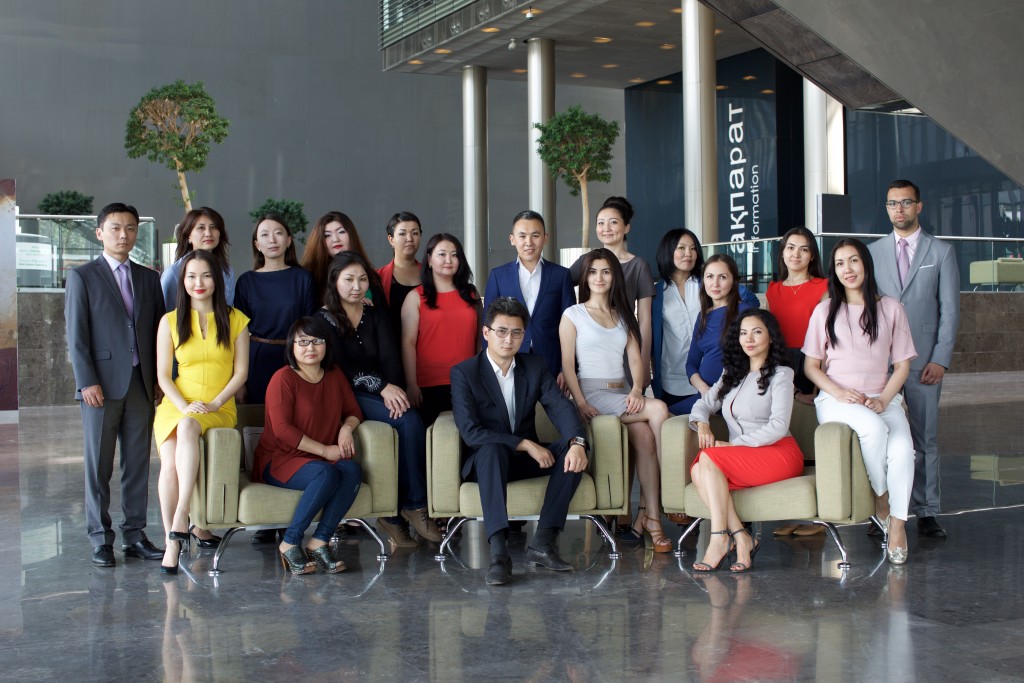ASTANA – The English-speaking Kazakh TV staff recently unveiled what it is like to be a television host, the cultural shocks of being a foreign journalist in the country and who they respect. The exclusive interview with The Astana Times was conducted on the eve of the June 28 Kazakh Journalist Day.
“The English Service on Kazakh TV is in charge of the in-house daily news production,” said international information department producer and head Lyazzat Shatayeva. “We are primarily engaged in the selection of the local and international news, translation of news texts, editing and voice-over.”
Shatayeva noted the crew covers an event on-site when there is a need to originally report in English.
“This often happens at international events held in Astana, such as the Astana Economic Forum, Eurasian Media Forum and large business and cultural events involving the expatriate community, diplomats, foreign officials and speakers,” she said.
Kazakh TV targets a versatile adult audience, primarily expatriates living and working in Kazakhstan and English-speaking viewers abroad who are interested in learning about the nation.
“Since our audience is so diverse, we strive to extensively cover significant events taking place in Kazakhstan, offering a daily gist of general, political, cultural, business and sports developments,” said Shatayeva.
She noted broadcast journalism is not a regular office environment with 9-5 hours.
“It’s a job that requires commitment, utmost accountability, working under pressure and overtime without a guaranteed or measurable return on effort. People here are passionate about what they do, often against all odds. Most of their dedication to quality reporting, excellence in performance and ethics comes from wanting to serve the people, make a positive impact and be part of a progressive change. When people are driven by higher goals like those, incredible things happen,” said Shatayeva.
The department is composed of translators, editors, anchors and voice-over artists. Yet at times, “everyone is a reporter, too, when needed,” she added.
Speaking of hosting her own programme, she admitted the job is challenging. That challenge, however, is not the language.
“I majored in English at the university and have spoken it as a working language throughout my entire career. As a TV host, I am on a continuous search to improve my presence, voice, pronunciation, speech clarity and pace, emotions that go with it, likeability as a media personality and credibility as an information source. I often try to find somebody to look up to, identify a person who is best at a similar job in the same industry,” she said.
Shatayeva noted she admires CNN anchors Anderson Cooper and Becky Anderson “for their strong presence and passion for excellent reporting and coverage of serious news,” The Young Turks’ Ana Kasparian and her all-time favourite, veteran Russian journalist Vladimir Pozner.
“Finding someone to look up to, learning from them, imitating them until I master the craft and find my own style is my approach to growing professionally. As Miles Davis once said, ‘sometimes you have to play a long time to be able to play like yourself,” she said.
A Foreigner on Kazakh Television
Chris Stanton is a foreign journalist working for Kazakh TV as a presenter and editor. He blended right in with the crew.
“First, when I arrived I felt an instant connection with my colleagues. Even though I am the only American working alongside locals in the capital as a reporter, I feel a sense of belonging to a close-knit team,” he said.
Stanton enjoys the opportunities he has been given by the network to meet interesting people and explore the culture.
“Working for Kazakh TV gives me the unique opportunity to look deeply into Kazakh politics, culture and traditions. In my opinion, it is one of the main elements one needs to do to understand the perspective of the country you are living in. For example ‘Global Talk,’ my television show that I host, lets me break out of the normal office routine and allows me to head to some of the top political events. When I am at these events, I am usually interviewing between six and eight high level managers, heads of companies, entrepreneurs and government officials from here and abroad,” he said.
During his first round of interviews with locals, he felt their initial shock of seeing a foreign reporter conducting news about Kazakhstan, a curiosity he still encounters from time to time.
“But on the other hand, the emotions that are portrayed by them are also a sense of eagerness and warmth, as well as an openness to answer my questions and learn more about my purpose here. I have witnessed the evolution of the Kazakh TV platform from the beginning I started to work here until now and I can tell you that Kazakh TV has a true willingness to become one of the top channels for expats wanting to know about Kazakhstan, not only domestically but also abroad,” he said.
Stanton feels the essential and timely role of the team.
“I believe Kazakh TV’s horizon is a bright one if we keep on track and push out quality content. I am honoured to be a witness to all the transformations going on with the channel and I am excited for what the future holds,” he said.
Insider’s Nuts and Bolts
Staff member Dana Omirgazy explained the challenges of being a translator in the department.
“Working as a news translator you simultaneously become a journalist. You just can’t translate mechanically. In fact, you need to write news stories in English and produce information in a specific way. It’s crucial to be able to present all the necessary information in a limited word count and provide the most important information to your targeted audience,” she said.
While translating and composing news stories, reports, programmes and articles in English, Omirgazy added it is essential not only to understand the language and consider the small differences of perception, but also the culture, linguistics and idioms in the language. Particular focus must be given to the style of information interpretation and accurate paraphrasing.
“Also to ensure a news story’s accuracy, we need to confirm the facts. Fact-checking is quite challenging and is a time-consuming process,” Omirgazy said.
“Kazakh TV is promoting the country’s image abroad; therefore I feel a great responsibility to perform my work with dignity in presenting life inside the country to foreign viewers,” she said.



